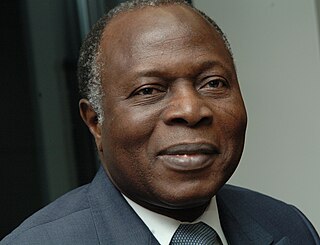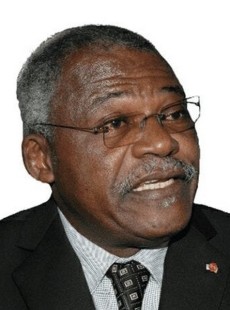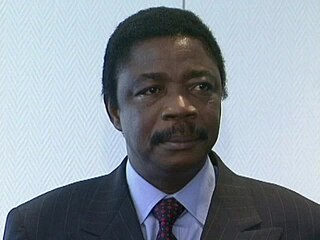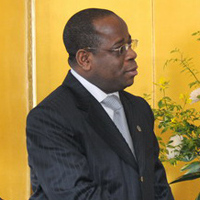Related Research Articles

Gnassingbé Eyadéma was a Togolese military officer and politician who was the president of Togo from 1967 until his death in 2005, after which he was immediately succeeded by his son, Faure Gnassingbé.

Koffi Sama was the Prime Minister of Togo from 29 June 2002 to 9 June 2005.

El-Hadj Bonfoh Abass was a Togolese politician who was the interim President of Togo from 25 February 2005 to 4 May 2005. He was the President of the National Assembly of Togo from February 2005 to July 2013.

Édouard Kodjovi "Edem" Kodjo, was a Togolese politician and diplomat. He was Secretary-General of the Organisation of African Unity from 1978 to 1983; later, in Togo, he was a prominent opposition leader after the introduction of multi-party politics. He served as Prime Minister from 1994 to 1996 and again from 2005 to 2006. Kodjo was President of the Patriotic Pan-African Convergence (CPP). Kodjo died on April 11, 2020, in Paris.
Fambaré Ouattara Natchaba was a Togolese politician. He was the President of the National Assembly of Togo from September 2000 to February 2005. He was a prominent member of the ruling Rally of the Togolese People (RPT) and a member of the Pan-African Parliament representing Togo.

Kwassi Klutse was a Togolese politician who was the Prime Minister of Togo from 20 August 1996 to 21 May 1999.
Gilchrist Olympio is a Togolese politician who was a long-time opponent of the regime of Gnassingbé Eyadéma and was President of the Union of Forces for Change (UFC), Togo's main opposition party from the 1990s til 2013. Olympio is the son of Sylvanus Olympio, Togo's first President, who was assassinated in a 1963 coup. He is now an ally of the current regime of Faure Gnassingbe, the son of the late President.

The Rally of the Togolese People was the ruling political party in Togo from 1969 to 2012. It was founded by President Gnassingbé Eyadéma and headed by his son, President Faure Gnassingbé, after the former's death in 2005. Faure Gnassingbé replaced the RPT with a new ruling party, the Union for the Republic (UNIR), in April 2012, dissolving the RPT.
Yawovi Madji Agboyibo was a Togolese attorney and politician. He served as Prime Minister of Togo from September 2006 to December 2007 and was National President of the Action Committee for Renewal (CAR), an opposition political party, from 1991 to 2008. He was the Honorary President of the CAR.

Parliamentary elections were held in Togo on October 14, 2007 for the 81 seats in the National Assembly. There were over 2,000 candidates, with 32 parties and 41 lists of independent candidates competing. The ruling Rally of the Togolese People (RPT) was victorious, winning a majority of 50 seats. The remaining seats were won by opposition parties; the Union of the Forces of Change (UFC) won 27 seats and the Action Committee for Renewal (CAR) won four seats. They were the first parliamentary elections since the beginning of multiparty politics in the early 1990s in which all major parties participated.
Barry Moussa Barqué is a Togolese politician who served in the government of Togo under President Gnassingbé Eyadéma for most of the period from 1979 to 1999. He has been a Special Adviser to the President since 1999.

Komlan Mally is a Togolese politician who served as Prime Minister of Togo from December 2007 to September 2008. He was Minister of State for Health from September 2008 to June 2011.
Komi Sélom Klassou is a Togolese politician who served as Prime Minister of Togo from 2015 to 2020. A member of the ruling Union for the Republic (UNIR), he served as Minister of Culture, Youth and Sports from 2000 to 2003, as Minister of Primary and Secondary Education from 2003 to 2007, and as First Vice-President of the National Assembly from 2007 to 2015.
Maurice Dahuku Péré was a Togolese politician who was President of the National Assembly of Togo from 1994 to 1999. He was the national president of the Democratic Alliance for the Fatherland, an opposition party.
Koffi Agbényéga Voule-Frititi was a Togolese politician, who served as a deputy in the National Assembly of Togo. He was a member of the Rally of the Togolese People (RPT).
Dama Dramani is a Togolese politician who was the President of the National Assembly of Togo from 2013 to 2018. He was Secretary-General of the Rally of the Togolese People (RPT), the ruling party, from 2003 to 2006, and following the 2007 parliamentary election he was President of the RPT Parliamentary Group in the National Assembly.

Atsutsè Kokouvi Agbobli was a Togolese politician. He served in the government under President Gnassingbé Eyadéma and was the President of the Movement for National Development (MODENA), an opposition party.
Issifou Okoulou-Kantchati was a Togolese politician, who last served in the government of Togo as Minister of City Planning and Housing.
Jean-Lucien Kwassi Lanyo Savi de Tové is a Togolese politician who served in the government of Togo as Minister of Trade from 2005 to 2007.

Presidential elections were held in Togo on 4 March 2010. Incumbent President Faure Gnassingbé—who won his first term in a presidential election that followed the death of his father, long-time President Gnassingbé Eyadema, in 2005—faced radical opposition candidate Jean-Pierre Fabre, the Secretary-General of the Union of the Forces of Change (UFC), as well as several minor opposition candidates.
References
- ↑ Journal Officiel de la Republique Togolaise, December 1, 1979, page 633 (in French).
- ↑ Journal Officiel de la Republique Togolaise, April 2, 1985, page 9 (in French).
- ↑ Journal Officiel de la Republique Togolaise, November 30, 1995, page 2 (in French).
- ↑ Journal Officiel de la Republique Togolaise, September 14, 2001, pages 2–3 (in French).
- ↑ "Le député Dahuku Péré remplacé au Parlement de la CEDEAO" Archived 2005-05-08 at the Wayback Machine , Panapress (diastode.org), August 27, 2002 (in French).
- ↑ "Le Parlement CEDEAO contre le remplacement d'un député togolais" Archived 2005-05-08 at the Wayback Machine , Panapress (diastode.org), September 4, 2002 (in French).
- ↑ List of deputies by region Archived 2007-11-07 at the Wayback Machine (lists deputies from the 2002-2007 parliamentary term) (in French).
- ↑ List of commissions in the National Assembly Archived 2007-10-30 at the Wayback Machine (in French).
- ↑ List of members of the Pan-African Parliament Archived 2011-05-18 at the Wayback Machine (as of March 15, 2004).
- ↑ "Togolese Speaker in New York for world parliamentary meeting", republicoftogo.com (nl.newsbank.com), September 6, 2005.
- ↑ "Les représentants au Parlement de la CEDEAO et au Conseil Supérieur de la Magistrature élus." Archived 2006-10-03 at the Wayback Machine , radiolome.tg (in French).
- ↑ "JUSTICE TOGOLAISE SE MODERNISE A GRAND PAS" Archived 2006-10-03 at the Wayback Machine , radiolome.tg (in French).
- 1 2 3 "Togo: Ruling party ends congress, elects new secretary-general", Radio Togo, Lome (nl.newsbank.com), December 19, 2006.
- 1 2 3 "Qui est SOLITOKI M. Esso ?" [ permanent dead link ], RPT website (in French).
- ↑ "La politique ne consiste pas à crier" Archived 2007-11-03 at the Wayback Machine , togolumiere.com (in French).
- ↑ List of members of the RPT Political Bureau, RPT website (in French).
- ↑ List of members of the RPT Central Committee [ permanent dead link ], RPT website (in French).
- ↑ "31 ministres dans la nouvelle équipe", Republicoftogo.com, 28 May 2010 (in French).
- ↑ "Togo: un nouveau gouvernement boycotté par l'opposition" [ dead link ], AFP, 18 September 2013 (in French).
- ↑ "Un nouveau gouvernement au Togo", République Togolaise website, 17 September 2013 (in French).